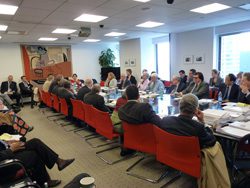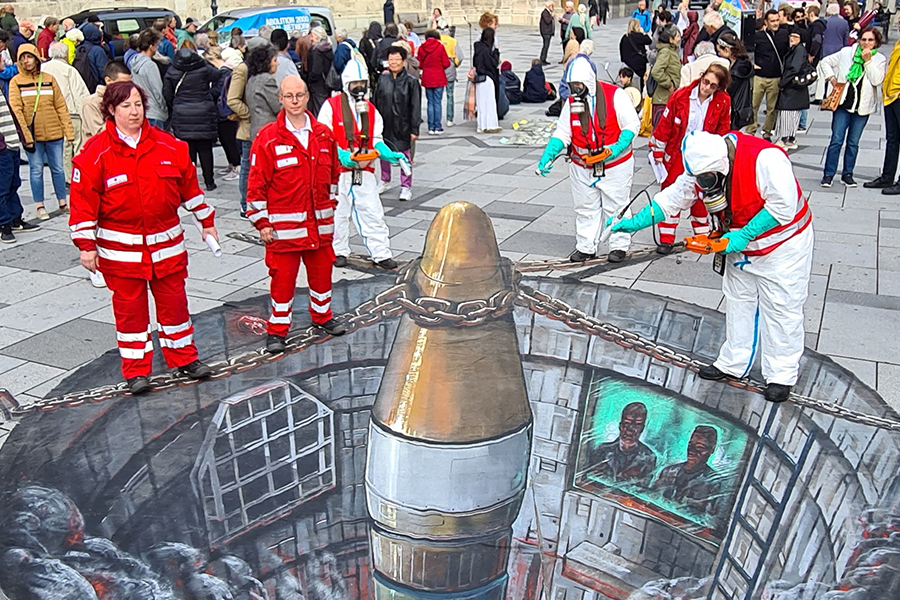Nuclear Weapons Convention or Framework of Agreements: Exploring Proposals for Nuclear Disarmament
Event Report by Rhianna Kreger
October 24, 2011
Forty diplomats and civil society experts gathered at the Permanent Mission of Switzerland to the United Nations to participate in a workshop titled “Nuclear Weapons Convention or Framework of Agreements: Exploring Proposals for Nuclear Disarmament,” organized as an integral component of the high-level consultation “Nuclear Disarmament: A Compass Point for Progress and Accountability,” sponsored by the EastWest Institute, the Global Security Institute and the James Martin Center for Non-proliferation Studies.
 |
|
Several distinguished panelists discussed various approaches to achieve the widely-shared goal of a secure world without nuclear weapons. While each approach varied in some measure, they all shared a similar strategy such as that expressed by Secretary-General Ban Ki-moon’s Five Point Proposal, one that has at its core the principle of universality.
A route to abolition underscored by the primacy of universalization might best be achieved through the strengthening of the application of international humanitarian law (IHL), as discussed by Ambassador Benno Laggner, Head of the Task Force on Nuclear Disarmament and Non-Proliferation of the Swiss Federal Department of Foreign Affairs. The acceptance of IHL’s applicability to nuclear weapons use and policy shifts the debate, the Ambassador said, from “whether” to disarm to “why” it is imperative. He discussed the leadership role of the Swiss Government in ensuring IHL’s inclusion in the consensus-based Final Document of the 2010 NPT Review Conference, and asserted that the work now is to “keep the issue on the agenda” as well as to “explore how to strengthen” its applicability in the nuclear field.
Ambassador Laggner claimed that IHL has “mobilizing power” to disarmament advocates, as demonstrated by the efficacy of its use in argumentation behind achieving prohibitions against landmines—via the “Ottawa Process”—and cluster munitions—the “Oslo Process.” He rejects the claim that nuclear weapons are too different from these other categories of weapons to be disarmed by an IHL-based campaign, insisting that IHL helps to highlight the universally humanitarian risks posed by the use of nuclear weapons, just as it helped to highlight the risks of other banned weapons.
 |
|
|
The need for global abolition efforts to expand beyond the current focus on US and Russia was a major theme of the presentation by Ambassador James Goodby of the Hoover Institution. “The effort to roll back nuclear dangers must become a true joint enterprise,” Ambassador Goodby warned, “or it will not succeed.”
Based in part on his proposal articulated in a recent Arms Control Today article, Ambassador Goodby illustrated a comprehensive framework approach that included immediate unilateral declarations and policy modifications, to be followed by “a more comprehensive international effort… to consolidate and institutionalize” a process leading towards abolition. Such a process would be broad in scope and go beyond “a focus on nuclear issues” which “alone can only go so far in creating the conditions for a world without nuclear weapons.” Such “ancillary agreements” that would establish security mechanisms and infrastructure would build inter-state confidence, enhance transparency and strengthen verification, enabling states to inch ever closer to the goal of “zero”. These steps, in effect, constitute the “building blocks” that would be in place to allow for a nuclear weapons treaty or convention to be most achievable, practical and effective.
 |
|
|
To the former President of the 1995 NPT Review and Extension Conference, Ambassador Jayantha Dhanapala, a non-legally binding process such as that articulated by Ambassador Goodby fails to “inject the requisite urgency” of the nuclear weapon risk, thereby running the risk of “going on infinitely.” In his view, an approach to abolition would be much better served within a timebound framework. From the 2000-era “Thirteen Steps” to the 1987 Disarmament and Development Final Document, Ambassador Dhanapala contributed to many substantial political declarations that failed to solicit the requisite commitment to implementation; a nuclear abolition process must go beyond toothless political statements and intentions.
The “Nuclear Weapon States will not lead us towards a nuclear weapon-free world,” Ambassador Dhanapala argued, calling for robust participation from civil society. Expressing fervent support for the utility of IHL, the President of Pugwash offered several routes that could be pursued to strengthen the norm against nuclear weapons, such as the inclusion of nuclear weapons use in the ICC’s Rome Statute to make such use a war crime, the amendment of the Geneva Conventions to make explicit nuclear weapons’ violation of IHL, or a global boycott of banks and institutions that profit from the nuclear weapons industry.
As a seasoned Washington insider, Ambassador Robert Grey, Jr. painted a desultory view of the United States’ disarmament commitment, lamenting the Obama administration’s budgetary “gift” to the nuclear labs as a “bribe” for START. The CTBT, he affirmed, will not be submitted for ratification this next year, and should a Republican win the White House, “you won’t get a CTB for another eight years, if ever” he predicted.
As a discussant, Ambassador Grey disagreed with Ambassador Dhanapala’s view of the potential for NGOs alone to advance the agenda. Instead, he placed great emphasis on the vital role of US allies, particularly middle power countries, to lead efforts away from dysfunctional bodies such as the Conference on Disarmament, such as Canada and Norway did with negotiations to ban landmines and cluster munitions.
The presentations incited a spirited discussion of several possible ways to advance these proposals. One government delegate suggested a possible General Assembly resolution to further strengthen IHL’s applicability to nuclear weapons use. Another, in support for the IHL approach, noted that the 1996 International Court of Justice opinion was instigated, not by security arguments from arms control advocates, but by health arguments put forth by the World Health Organization. Ambassador Richard Butler of the Middle Powers Initiative voiced emphatic support for Ambassador Goodby’s focus on the security of a nuclear weapon-free world, and proposed that MPI work with middle power governments to establish an ongoing discussion of the governance structures that such a world would require.
» Read a report of the full day’s events
» View a photo gallery of the day’s events
» Read the report of the plenaries by the EastWest Institute
» Read the report of the event from the UN News Centre
» Read the report of Mr. Aiyar’s presentation published in The Economic Times
» Download “Nuclear Disarmament: Compass Point for Progress and Accountability,” the conference description and program
» Download the full transcript of the Secretary-General’s presentation
» Download the report of the Advisory Group to Revitalize the Rajiv Gandhi Action Plan
» Read the entirety of “Pacta Sanct Servanda,” Mr. Granoff’s presentation
» Read the full transcript of Ambassador James Goodby’s presentation
» Read a summary of the accountability workshop at the Kazakh Mission
![]()









